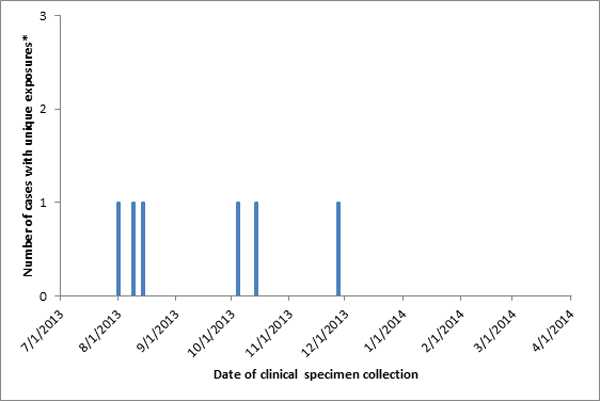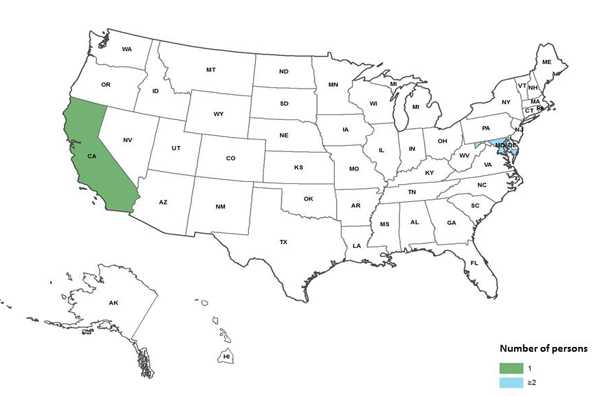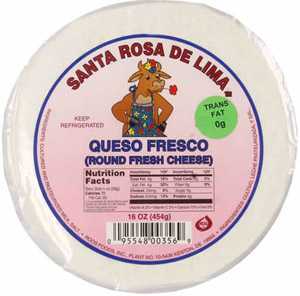Multistate Outbreak of Listeriosis Linked to Roos Foods Dairy Products (Final Update)
Posted April 18, 2014 9:30 AM ET
This investigation is closed.Listeria monocytogenes infection (listeriosis) is an important cause of illness in the United States. More information about listeriosis, and steps people can take to reduce their risk of infection, can be found on the CDC Listeria Web Page.
Highlights
- Read the Advice to Consumers & Cheese Retailers»
- A total of eight persons infected with the outbreak strain of Listeria monocytogenes were reported from two states.
- The number of ill persons identified in each state was as follows: California (1) and Maryland (7)
- Seven of eight ill persons were hospitalized. One death was reported in California. Five of the illnesses (2 mother-newborn pairs and a newborn) were related to pregnancy.
- All patients are of Hispanic ethnicity.
- No new ill persons were reported since the last update on March 12, 2014.
- A collaborative investigation by local and state public health and regulatory agencies, CDC, and the U.S. Food and Drug Administration (FDA) indicated that cheese products made by Roos Foods were the likely source of this outbreak.
- The outbreak strain of Listeria monocytogenes that caused the illnesses was found in cheese products produced by Roos Foods of Kenton, Delaware. These cheese products have been recalled.
- Whole-genome sequences of the Listeria strains isolated from Roos Foods cheese products were available after the recall and were found to be highly related to sequences of the Listeria strains isolated from the patients.
- On March, 11, 2014, the FDA suspended the food facility registration of Roos Foods, meaning that the company cannot distribute any products.
- This outbreak appears to be over. L. monocytogenes infection (listeriosis) is an important cause of illness in the United States. More information about listeriosis, and steps people can take to reduce their risk of infection, can be found on the CDC Listeria website (Spanish website).
Investigation Summary
CDC collaborated with public health and regulatory officials in several states and the U.S. Food and Drug Administration (FDA) to investigate a multistate outbreak of Listeria monocytogenes infections (listeriosis). Joint investigation efforts indicated that cheese products made by Roos Foods of Kenton, Delaware were the likely source.
Public health investigators used DNA “fingerprints” of Listeria obtained through testing with pulsed-field gel electrophoresis, or PFGE, to identify cases of illness that may have been part of this outbreak. They used data from PulseNet, the national subtyping network of state and local public health laboratories and federal food regulatory laboratories that performs molecular surveillance of foodborne infections.
Whole-genome sequencing (WGS) of L. monocytogenes strains isolated from patients and from Roos Foods cheese products was performed. This WGS testing was available as part of a Listeria WGS project being conducted by CDC, FDA, the US Department of Agriculture, the National Institutes of Health, and state partners. The project involves sequencing of all US Listeria isolates from sick people and food in as close to real-time as possible. WGS provides genetic information that allows investigators to rapidly identify differences among isolates. Compared with PFGE, WGS provides clearer distinction between cases and foods that are likely part of a given outbreak and those that are not.
A total of eight persons infected with the outbreak strain of Listeria monocytogenes were reported from five states. The number of ill people identified in each state was as follows: California (1), Maryland (7). No new ill persons were reported since the last update on March 12, 2014.
Among persons for whom information was available, dates that illness was diagnosed ranged from August 1, 2013 to November 27, 2013. Seven of the eight ill persons were hospitalized. Five of the illnesses were related to a pregnancy, including four illnesses in two mother–newborn pairs, and one illness in only the newborn. The three other illnesses occurred among adults. One death was reported in California. All ill persons were reported to be of Hispanic ethnicity.
Investigation of the Outbreak
Epidemiologic, laboratory, and traceback investigations conducted by officials in local, state, and federal public health, agriculture, and regulatory agencies indicated that cheeses manufactured by Roos Foods was the likely source of this outbreak of listeriosis.
In interviews, ill persons answered questions about foods consumed and other exposures in the month before becoming ill. All five adults associated with this outbreak in Maryland reported consuming soft or semi-soft Hispanic-style cheese and all shopped at different locations of same food store chain (Chain A). Three of five adults reported consuming a cheese produced by Roos Foods.
Testing of cheese products collected from Chain A stores was performed in Maryland and Virginia. Virginia’s Division of Consolidated Laboratory Services (DCLS) identified the outbreak strain of Listeria monocytogenes in a sample of Cuajada en Terron (fresh cheese curd) collected by the Virginia Department of Agriculture and Consumer Services (VDACS) from a Chain A store. This cheese was produced by Roos Foods of Kenton, Delaware and was later repackaged in the Chain A store. VDACS issued a press release on February 15, 2014 instructing persons who purchased this product not to consume the cheese and to discard any remaining product.
VDACS subsequently collected pre-packaged Cuajada en Terron produced by Roos Foods from Chain A that was not repackaged in the store. The Virginia DCLS identified the outbreak strain of Listeria monocytogenes from these samples; a consumer advisory was issued on February 21, 2014. In addition, the Maryland Department of Health and Mental Hygiene tested samples of pre-packaged cheese products purchased at Chain A stores; cultures of those products produced by Roos Foods also yielded the outbreak strain Listeria monocytogenes. Roos Foods cheese products were labeled as made with pasteurized milk. On February 19, 2014, the Maryland Department of Health and Mental Hygiene issued a warning to consumers to not eat any cheese products made by Roos Foods. The District of Columbia issued a similar warning to consumers on February 20.
In working with FDA, on February 23, Roos Foods voluntarily recalled all lots of its Cuajada En Terron, Cuajada/Cuajadita Cacera, Cuajada Fresca, Queso Fresca Round, and Queso Dura Viejo hard cheeses marketed under its Mexicana, Amigo, and Santa Rosa De Lima brands. These cheeses were manufactured or repacked by Roos. Roos Foods also recalled Queso Fresco marketed under the Anita brand. These products were distributed through retail stores in Maryland, Virginia, and the District of Columbia, including many retail stores other than Chain A.
On February 25, 2014, Roos Foods voluntarily expanded their February 23 recall to include all lots of Amigo and Mexicana brands of Requesón (part-skim ricotta) in 15 oz. and 16 oz. plastic containers and all lots of Amigo, Mexicana, and Santa Rosa De Lima brands of Queso de Huerta (fresh curd cheese). On March 1, 2014, Roos Foods further expanded and clarified the description of products in its recall.
On March 11, 2014, FDA suspended the food facility registration of Roos Foods in response to this outbreak and findings of unsanitary conditions at the company’s facility during an FDA inspection from February 18–March 4, 2014. A company without a food facility registration cannot distribute any food products. During the inspection, FDA collected environmental swabs from different areas of the facility, including the cheese processing room and various pieces of equipment. Several of the swabs matched the outbreak strain.
April 16, 2014
Final Case Count Update
This outbreak appears to be over. Listeria monocytogenes infection (listeriosis) is an important cause of illness in the United States. More information about listeriosis, and steps people can take to reduce their risk of infection, can be found on the CDC Listeria Web Page.
A total of eight persons infected with the outbreak strain of Listeria monocytogenes were reported from five states. The number of ill people identified in each state was as follows: California (1), Maryland (7). No new ill persons were reported since the last update on March 12, 2014.
Among persons for whom information was available, dates that illness was diagnosed ranged from August 1, 2013 to November 27, 2013. Seven of the eight ill persons were hospitalized. Five of the illnesses were related to a pregnancy, including four illnesses in two mother–newborn pairs, and one illness in only the newborn. The three other illnesses occurred among adults. One death was reported in California. All ill persons were reported to be of Hispanic ethnicity.
March 12, 2014
Investigation Update
On March 11, 2014, the Food and Drug Administration (FDA) suspended the food facility registration of Roos Foods in response to this outbreak and findings of unsanitary conditions at the company’s facility during an FDA inspection from February 18–March 4, 2014. A company without a food facility registration cannot distribute any food products.
March 7, 2014
Investigation Update
Whole-genome sequencing (WGS) of Listeria monocytogenes strains isolated from Roos Foods cheese products has been performed by the Food and Drug Administration (FDA) and Virginia’s Division of Consolidated Laboratory Services. These strains were found to be highly related by WGS to the Listeria strains isolated from patients in this outbreak, adding further confidence that cheese products produced by Roos Foods were a likely source of the outbreak.
These WGS results were available as part of a Listeria WGS project being conducted by CDC, FDA, the US Department of Agriculture, the National Center for Biotechnology Information/National Institutes of Health, and state and international partners. This project involves sequencing of all US Listeria isolates from sick people and food in as close to real-time as possible. WGS provides genetic information that allows investigators to rapidly identify differences among isolates. Compared with pulsed-field gel electrophoresis (PFGE), WGS provides clearer distinction between cases and foods that are likely part of a given outbreak and those that are not.
March 3, 2014
Investigation Update
On March 1, 2014, Roos Foods expanded and clarified the description of products in its recall, which was initiated on February 23 and expanded on February 25. The recall includes all lots and all product sizes and containers of these Amigo, Anita, Mexicana, and Santa Rose de Lima brands of cheeses:
- Cuajada En Terron,
- Cuajada/Cuajadita Cacer,
- Cuajada Fresca,
- Queso Fresco Round,
- Queso Cojito Molido,
- Queso Duro Blando (hard cheese),
- Queso Duro Viejo (hard cheese),
- Requeson,
- Queso de Huerta, and
- Queso Fresco.
These cheeses were packaged in various sized clear plastic wrapped Styrofoam trays, clear plastic wrapped, clear plastic vacuum package, and clear rigid plastic containers.
Roos Foods is also recalling all product sizes and containers of the following sour creams and butter:
- Santa Rosa de Lima Crema Salvadorena Cultured Sour Cream,
- Crema Pura Mexicana Cultured Sour Cream,
- La Chapina Crema Guatemalteca Guatemalan Style Cream,
- Amigo Brand Crema Centroamericana Cultured Sour Cream, and
- Santa Rosa de Lima Mantequilla de Bolsa Tradicion Centroamericana.
These sour creams were packaged in various sized white plastic tubs, clear plastic bags, clear plastic pouches, and clear plastic jars. The recalled products were distributed through retail stores in Delaware, Maryland, New Jersey, New York, Virginia, and the District of Columbia.
FDA issued a notice of the additional expanded recall on March 2 with advice to consumers, retailers, and restaurants.
February 26, 2014
Investigation Update
On February 25, 2014, Roos Foods voluntarily expanded their February 23 recall to include all lots of Amigo and Mexicana brands of Requesón (part-skim ricotta) in 15 oz. and 16 oz. plastic containers and all lots of Amigo, Mexicana, and Santa Rosa De Lima brands of Queso de Huerta (fresh curd cheese).
FDA issued a notice of the expanded recall on February 25 with advice to consumers, retailers, and restaurants.
Consumers should not eat any of the following brands of cheese manufactured or repackaged by Roos Foods of Kenton, Delaware: Amigo, Anita, Mexicana, and Santa Rosa De Lima. These products were distributed through retail stores in Maryland, Virginia, and the District of Columbia.
February 24, 2014
Investigation Update
In interviews, ill persons answered questions about foods consumed and other exposures in the month before becoming ill. All patients in Maryland reported consuming soft or semi-soft Hispanic-style cheese and all shopped at different locations of the same Hispanic-style local food store chain (Chain A). Testing of cheese products collected from Chain A stores was performed in Maryland and Virginia.
Virginia’s Division of Consolidated Laboratory Services (DCLS) identified Listeria monocytogenes in a sample of Caujada en Terron (fresh cheese curd) collected by the Virginia Department of Agriculture and Consumer Services (VDACS) from a Chain A store. The strain isolated from this product was indistinguishable by PFGE from the Listeria strainisolated from the 8 patients (outbreak strain). This cheese was produced by Roos Foods of Kenton, Delaware and was later repackaged in the Chain A store. VDACS issued a press release![]() on February 15, 2014, instructing persons who purchased this product not to consume the cheese and to discard any remaining product.
on February 15, 2014, instructing persons who purchased this product not to consume the cheese and to discard any remaining product.
February 21, 2014
Initial Announcement
CDC is collaborating with public health and regulatory officials in several states and the U.S. Food and Drug Administration (FDA) to investigate a multistate outbreak of Listeria monocytogenes infections (listeriosis).
Public health investigators are using data from PulseNet, the national subtyping network of state and local public health laboratories, CDC, and federal food regulatory laboratories that performs molecular surveillance of foodborne infections, to identify cases of illness that may be part of this outbreak. The PulseNet data consists of DNA “fingerprints” of Listeria obtained through testing with pulsed-field gel electrophoresis, or PFGE. We are supplementing PFGE data with whole-genome sequencing. The 5 isolates already sequenced are closely related.
A total of 8 persons infected with the outbreak strain of Listeria monocytogenes have been reported from two states. The number of ill people identified in each state is as follows: California (1), Maryland (7).
Among persons for whom information is available, dates that illness was diagnosed range from August 1, 2013 to November 27, 2013. Seven of the eight ill persons were hospitalized. Five of the illnesses were related to a pregnancy; two of these were diagnosed in two mother–newborn pairs, and one in only the newborn. The three other illnesses occurred among adults. One death was reported in California. All ill persons were reported to be of Hispanic ethnicity.
The outbreak can be visually described with a chart showing the number of persons who were diagnosed each day. This chart is called an epidemic curve or epi curve. Clinical specimens that were collected after February 1, 2014 might not be reported yet due to the time it takes between when a person becomes ill and when the illness is reported. This takes an average of 2 to 3 weeks.
About 800 laboratory-confirmed cases of listeriosis are reported each year in the United States, and typically 3 or 4 outbreaks are identified and reported to CDC annually. Some foods that have been linked to outbreaks in recent years include several types of cheeses (Mexican-style cheeses, soft ripened cheeses, and imported ricotta salata cheese), whole cantaloupe, raw sprouts, and precut celery.
Investigation of the Outbreak
In interviews, ill persons answered questions about foods consumed and other exposures in the month before becoming ill. All patients in Maryland reported consuming soft or semi-soft Hispanic-style cheese and all shopped at different locations of same food store chain (Chain A). Testing of cheese products collected from Chain A stores was performed in Maryland and Virginia.
Virginia’s Division of Consolidated Laboratory Services (DCLS) identified the outbreak strain of Listeria monocytogenes in a sample of Caujada en Terron (fresh cheese curd) collected by the Virginia Department of Agriculture and Consumer Services (VDACS) from a Chain A store. This cheese was likely produced by Roos Foods of Kenton, Delaware and was later repackaged in the Chain A store. VDACS issued a press release on February 15, 2014 instructing persons who purchased this product not to consume the cheese and to discard any remaining product.
VDACS subsequently collected pre-packaged Caujada en Terron produced by Roos Foods from Chain A that was not repackaged in the store. The Virginia DCLS identified Listeria monocytogenes from these samples; a consumer advisory was issued on February 21, 2014. DNA fingerprinting and whole-genome sequencing will be performed on these isolates. In addition, the Maryland Department of Health and Mental Hygiene has tested samples of pre-packaged cheese products purchased at Chain A stores; those products produced by Roos Foods are preliminarily positive for Listeria monocytogenes. On February 19, 2014, the Maryland Department of Health and Mental Hygiene issued a warning to consumers to not eat any cheese products made by Roos Foods. Their warning stated that Roos Foods cheese products are sold under brand names Santa Rosa de Lima, Amigo, Mexicana, Suyapa, La Chapina, and La Purisima Crema Nica.
FDA posted information about the investigation on February 21, 2014
Further investigation is needed to determine the source of the patients’ illnesses, including whether the illnesses were related to food products that tested positive for Listeria.
More Information:
- Page last reviewed: July 13, 2015
- Page last updated: July 13, 2015
- Content source:


 ShareCompartir
ShareCompartir


